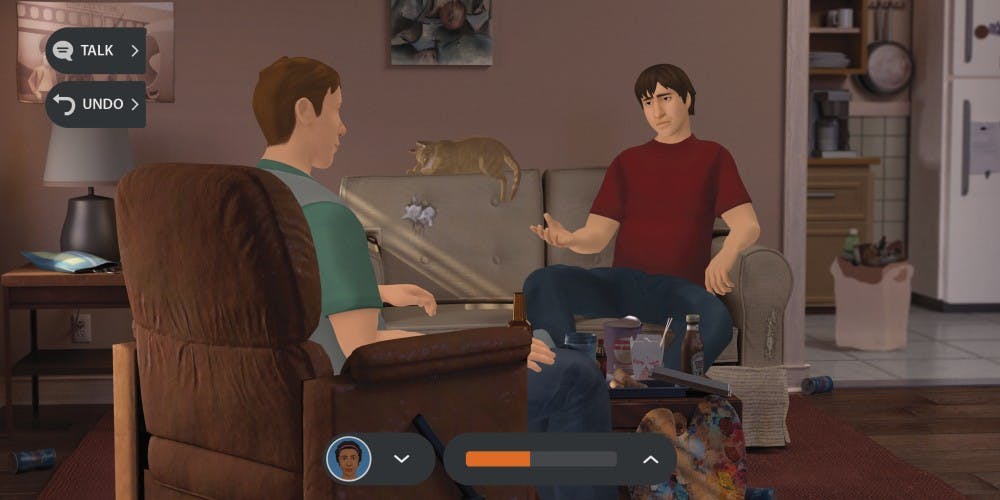On Sunday, Nov. 10, the University held the second annual mandatory Kognito Day to educate first-year students on how to address and discuss the mental health concerns of their peers through zee group discussions and completion of an online simulation.
As reported in The Daily Princetonian last November, Kognito is a 35-minute online course intended to educate college students about signs of mental distress in their peers and teach intervention skills. Through both education and simulation, Kognito allows students to read about mental health concerns and practice interventions to connect students in distress with proper resources.
Mellisa Thompson, Associate Dean of Undergraduate Students, said that the high level of engagement with Kognito last year led to a continuation of the program.
“Last year we had over a thousand students — which was amazing — across campus take the Kognito online simulation,” she noted. “Out of all that success, this year, we’re doing it again.”
Thompson added that, though Kognito Day is a part of the First Year Residential Experience program, the training is available to all University students.
“We just want to get it out there to as many people as possible … that’s our hope: that we’ll not only reach our numbers last year, but surpass [them],” Thompson said.
Furthermore, Thompson highlighted her belief in the importance of the zee group conversation after completion of the simulation.
“That discussion afterwards is really beneficial for the group,” she added. “I think it’s an opportunity for folks to ask questions if they don’t know about resources or how to seek out help ... Being able to talk about [mental health] from a Princeton lens is really important.”

First-year student Alkin Kaz indicated that he found Kognito “useful in introducing the topic of being here when your friends need you … [and] how to manage the situation [of having a friend in distress].”
Kaz continued that he believed the program was “pretty relevant to the situation a Princeton student might face, with [the University’s] academic rigor and heavy workload.” He added that he finds discussion of mental health on campus to be lacking.
“People seem not to discuss the problems, the internal struggles they are working through … I definitely think it would be better if [students] discussed it more,” he said.
Nonetheless, Kaz expressed that he feels comfortable with starting a dialogue surrounding mental health resources at the University.

“I would feel pretty comfortable in advising my fellow peers, if they have problems, to go [to Counseling and Psychological Services],” he explained.
In further discussion of the particular features of Kognito’s training, administrators and students raised mental health concerns that may not have been directly addressed by the program.
Speaking to Kognito’s emphasis on depression and anxiety, Thompson noted, “I think … [Kognito] starts the conversation. There may be signs like anxiety and depression that may be indicative of some other concern that students are grappling with, and so it’s all about starting that conversation.”
Ellen Whiteside ’22, who completed the Kognito training last year, indicated her belief that the skills taught by the program may not be applicable in all mental health situations.
“There are mental illnesses that cause a lot of shame and there are those that don’t, and there’s a spectrum between those two, but I think you have to approach those situations with a type of nuance that maybe the facilities here aren’t equipped with, not that they aren’t trying,” she said.
Ameena Faruki ’22 offered a similar critique, stating, “I remember not liking the Kognito program because I feel like it offered blanket advice.”
Faruki went on to suggest that a better approach might be building a close relationship with one’s peers, wherein discussions of mental health can occur.
“It’s necessary to talk about these issues, but … I think that rather than focus[ing] on what kinds of words you use … what works a lot better is establishing trust,” Faruki said. “A lot of the time, people struggling with these things are very well aware … and it’s very condescending, in a way, to give this advice.”
Kaz additionally expressed cynicism regarding the University’s use of the program.
“When you load students with a lot of work … and also provide mental health services, there is a seeming contradiction,” Kaz said. “On the one hand, you are messing with student health with an excessive workload, and on the other hand, you are trying to fix this issue.”
Thompson noted her belief that “it’s important that we take a step back and think of how to adequately support our friends.”
She emphasized the importance of considering other possible actions that could be undertaken.
“This is not a checkbox for us, this is about how we start this conversation, and then take feedback and continue creating opportunities for discussion and engagement,” Thompson said.








